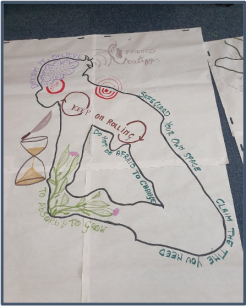Body-mapping as a research method

Karin Hannes is a professor at the Faculty of Social Science of the Catholic University Leuven. Her article on Body Mapping appeared in Sociologie Magazine. Body-mapping is a data collection and analysis process in which research participants design a life-size map of their own bodies through painting, drawing or other artistic techniques. A body-map represents the participant's perception of who they are in relation to their living or working environment. In sociological jargon, we sometimes speak of an "embodiment" movement in this context. The method is usually used within the fields of mental health and social welfare, social activist, empowerment movements or artistically inspired, participatory research processes, with the aim of outlining personalized care or policy pathways. The research-based tendency to neglect consciousness relative to one's own body in investigating complex experiences, social processes and social contexts is characteristic of a Western way of thinking about research. Body-mapping, a methodology initially developed and practiced in the Global South, further stretches the dualism between mind and body. It has been used for example with researchers who had worked in challenging conditions, e.g., with refugee communities in refugee camps, with HIV patients in street gang-controlled areas, or with children in war-affected regions. Using body-mapping in a group process often has a positive effect on the dynamics between participants. It makes it possible for them to learn to see the differences and similarities between the various visual narratives being recorded and, on that basis, to devise ideas and trajectories that can respond to these experiences in a constructive way.